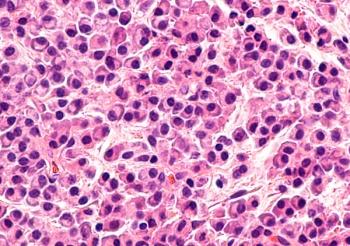
Data from DESTINY-Breast06 support the priority review designation for T-DXd as a treatment for HER2-low or HER2-ultralow breast cancer.

Your AI-Trained Oncology Knowledge Connection!


Data from DESTINY-Breast06 support the priority review designation for T-DXd as a treatment for HER2-low or HER2-ultralow breast cancer.

Experts in gastrointestinal cancer focus on frontline therapy options for patients with pancreatic cancer.

A nurse practitioner discussed how her role plays a vital part in patient care for those undergoing talquetamab treatment for multiple myeloma.

In 2 clinical trials, 64Cu-SAR-bisPSMA was shown to be effective in detecting prostate cancer in patients with PSMA-positive lesions.

Hypofractionated postmastectomy radiotherapy was noninferior to standard radiation in patients who underwent a mastectomy.

Experimental regimens did not cross the threshold to show superiority vs standard cisplatin plus 70 Gy radiation in those with HPV-associated oropharynx cancer.

Uterine transposition is a newer tactic in the surgical oncology field to help preserve fertility for patients undergoing pelvic radiation.

Data show no differences in bowel function between treatment arms based on factors including age, disease risk, and fractionation schedule.

The University of Chicago goes against Northwestern Medicine to see who will be crowned the winner in the NSCLC debate.

James R. Berenson, MD, describes ongoing efforts to evaluate treatment with JAK inhibitors like ruxolitinib among patients with multiple myeloma.

Samantha Shenoy, NP, MSN, emphasized educating patients with multiple myeloma to help prepare them for potential taste alterations after talquetamab.

Experts discussed the advancements in non–small cell lung cancer treatment and developments in both antibody-drug conjugate–based approaches and targeted therapies.

Samantha Shenoy, NP, MSN, indicated that neurological issues were not prevalent with talquetamab, despite occurrences with other bispecifics antibodies.

Experts spoke about the best practices for mitigating adverse effects associated with CAR T-cell therapy in relapsed/refractory multiple myeloma.

Experts in multiple myeloma discussed optimal dosing strategies for bispecific antibodies for patients with relapsed/refractory multiple myeloma.

The FDA granted traditional approval to selpercatinib for patients with advanced or metastatic medullary thyroid cancer with a RET mutation.

The combination of talquetamab plus daratumumab yields improved patient outcomes in those with relapsed/refractory multiple myeloma.

Combining talquetamab with teclistamab elicits responses even among those with extramedullary disease in the RedirecTT-1 trial.

“We are now able to increase the lifespan in some of these most deadly forms of thyroid cancer solely due to gene profiling and targeted medicine,” said Geoffrey David Young, MD, PhD, FACS.

Samantha Shenoy, NP, MSN, discussed common oral and dermatologic adverse effects associated with talquetamab in patients with myeloma.

Eleven votes were cast against the favorability of using anti–PD-1 inhibitors in patients with ESCC and a PD-L1 expression of less than 1.

These findings demonstrate the potential risks associated with CNI-based immunosuppression in stem cell transplantation without concurrent strategies to eliminate alloreactive T cells.

In a multicenter study, researchers have a phase 1, open-label study of CB-012, a next-generation CRISPR-edited allogeneic anti-CLL-1 CAR-T cell therapy, aimed at treating adults with relapsed/refractory AML.

Extended follow-up from the CASSIOPEIA trial illustrates the PFS and MRD benefits of daratumumab-based induction/consolidation and maintenance therapy.

Ten votes were cast against PD-L1 as an efficacy biomarker for therapies intended to treat patients with gastric or GEJ adenocarcinoma.

Results from the ARANOTE trial support the supplemental new drug application for darolutamide/ADT in metastatic hormone-sensitive prostate cancer.

A subgroup analysis from the PERSEUS trial showed sustained PFS benefit in patients with newly diagnosed multiple myeloma receiving D-VRd.

Responses appear to improve over time in those with transplant-eligible newly diagnosed multiple who receive the belantamab mafodotin-based combination.

Data from a real-world study further illustrates clinical benefit in patients with cholangiocarcinoma receiving pemigatinib.

As the uterus is moved to the anterior abdominal wall, patients now have a chance of preserving their fertility during radiation therapy.